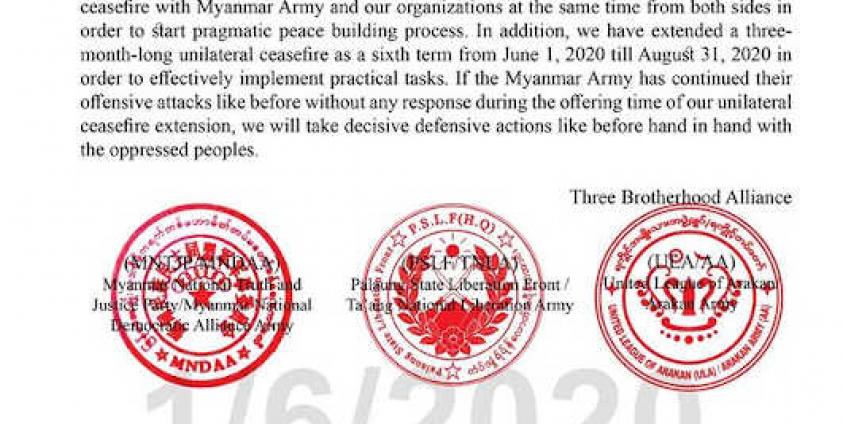On June 1, the Three Brotherhood Alliance, made up of Arakan Army (AA), Myanmar National Alliance Army (MNDAA) or Kokang and Ta’ang National Liberation Army (TNLA), declared its sixth extension of unilateral ceasefire which will last until the end of June.
Its six-point announcement includes:
- To resolve serious political problems through political dialogue,
- To effectively carry out practical task s in conformity with the peace process between our organizations and the government of Myanmar and its military,
- To protect life and property of the general public for the sake of the majority of people occurring without any fighting,
- To actually implement bilateral ceasefire agreements and to end civil war completely.
- To assist preventive and combative measures to fight against COVID-19 pandemic, and
- To promote peace in Myanmar and stability of the borders of neighboring countries bordering with Myanmar.
We have already extended our unilateral ceasefire for five terms from 2019 to May 2020.
The AA announcement further pointed out that the Tatmadaw exclusion of Arakan State from its unilateral ceasefire and its attacks to annihilate AA using air, navy and infantry is the cause of ongoing armed conflict. If there is pre-condition and exclusion of any ethnic armed organization (EAO) in Tatmadaw’s unilateral ceasefire like the government’s spokesman and media reports are saying the peace process will be hindered. But the announcement said its group is keen to find way to resolve the problems.
Likewise, the Tatmadaw has also announced unilateral ceasefire from May to end of August, excluding where the AA and its Three Brotherhood Alliance members operate.
Although officially the Tatmadaw spokesman said the exclusion covers where there are armed conflict with the AA, which predominantly is northern Arakan State, it is not clear if northern Shan State and Kachin State are also included.
AA operates in northern Shan State together with the Three Brotherhood Alliance as a member
and as well in Kachin State, where it has thousands of recruits in Kachin Independence Army (KIA)-controlled area.
And while there have been armed clashes with the TNLA quite recently in northern Shan State, there still has been no firefight in KIA-controlled area with the AA so far, despite the Tatmadaw’s ultimatum and warning to the KIA that it could attack AA troops in Kachin State.
KIA is part of the Northern Alliance – Burma (NA-B) in which all the Three Brotherhood members are involved and is a military alliance. For more than a year, the KIA has not taken part in military action under NA-B, due to negotiation concerning the return of Kachin internally displaced persons, and that was the reason why the Three Brotherhood military alliance was formed to counter the Tatmadaw’s on and off offensives.
However, the KIA has, time and again, made it clear that it would only sign bilateral ceasefire with the government if all the NA-B members signed together on the same agreement or truce arrangement.
It seems unilateral ceasefire from both warring camps isn’t producing any positive result and instead even fueling the conflict.
First, as the Tatmadaw exclusion of an EAO or selective group of EAOs isn’t going to produce positive result as the Three Brotherhood has rightly pointed out. It has to be nationwide.
Second, the Tatmadaw and government refusal to accept the AA presence in Arakan State and demanding that it goes back to Kachin State, where it was originally formed, is against the existing reality. Nobody will back down on this and a compromise has to be thought out if political bargaining is to take place.
Third, some kind of truce at least to fight the Covid-19 pandemic, has to be reached, as this is the fight of mankind survival and much more important than one party imposing its will on another.
Fourth, the civil war in Myanmar or Burma has gone on for too long and now more than seven decades. The self-help conflict mediation has not brought us one little bit nearer to reconciliation and harmony but only renewed animosity and hatred. It is time to realize that this self-owned and self-regulate conflict resolution are not working at all.
Taken into account of the facts mentioned, the warring parties should make use of an international neutral third party mediation approach, on which all could have confidence. It could be ASEAN, EU, UN or even the combination of all. The point is to accept the idea that the warring parties need third party mediation help.
As far as this writer is concerned, the EAOs are all for third party mediation from the outset and thus only the government side will have to agree to the idea.
It won’t be a bad to start with a genuine nationwide ceasefire declaration, buttressing it with bilateral ceasefire between the NA-B and the government, in the name of tackling Covid-19 pandemic. And from this all could expand the process by including third party mediation to end the decades-long civil war, which is slowly but surely pushing the country from fragile to failed state status.
It is time that all stakeholders wake up to the reality before it is too late.








